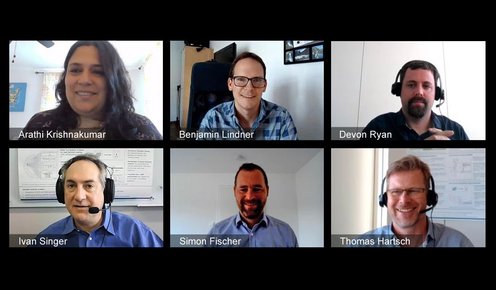イベントレポート:Boehringer Ingelheim(BI)社共催、Genedata Selector CLD Open Forum ~ 次世代シーケンス(NGS)アプローチによる細胞株開発の最適化に関する意見交換
July 18, 2022
Marie-Ange Kouassi
From Single-Cell RNA Sequencing (scRNA-seq), and Targeted Locus Amplification (TLA) to Multi-omics analyses, the wide variety of valuable Next-Generation Sequencing (NGS)-based applications are revolutionizing and streamlining the cell line development (CLD) process for biotherapeutic manufacturing. Genedata Selector® enables innovative biopharmaceutical companies to implement NGS in CLD to e.g., characterize transgene integration sites following genetic engineering and perform comprehensive characterization using integrative omics analyses. Genedata is committed to empowering companies undergoing biopharma R&D by providing the digital tools to simplify and automate NGS data analysis and by bringing experts together to exchange lessons learned, perspectives, and best practices. On 14th July 2022, Genedata hosted its 5th virtual industry workshop. This time, the event was co-hosted in collaboration with Boehringer Ingelheim (BI) with 23 companies present to discuss the impact of NGS-based applications on Cell Line Development.
The event began with an introductory warm welcome from Simon Fischer, Senior Principal Scientist & Head of Cell Biology at BI who shed light on the Genedata Selector partnership and the value NGS has brought to BI’s cell line development processes since its implementation in-house. This has allowed them to replace classical characterization methods such as Sanger Sequencing, Northern Blotting, and qRT-PCR. These methods were previously used to verify transgene sequences in stable cell lines after transfection or detect sequence variants during cell line stability assessment. At BI, NGS has also enabled deep troubleshooting of abnormal characteristics of products in development while enabling new applications and other development activities.
Kicking off the exciting line-up was Benjamin Linder, Senior Data Scientist at BI. Benjamin presented a comprehensive analysis of BI’s top 3 production cell clones. The NGS-based technique Targeted Locus Amplification enabled his team to perform in-depth genetic characterization and to identify integration sites in the genome following random transgene integration. The performance of generated cell lines was characterized by assessing viability, antibody titers, and cell stability. Furthermore, TLA data analysis enabled the identification of clones derived from a common mother cell. To analyze the generated TLA data in-house, a dedicated bioinformatics pipeline built in Genedata Selector was used.

The following presentation focused on achieving superior product quality and increasing product yields, was given by Arathi Krishnakumar, Senior Principal Scientist at Bristol Myers Squibb (BMS). Arathi shared on the use of omics technologies at BMS for a systems biology approach to better understand the cellular machinery that supports antibody production and differentiate high- and low-producing clones. Her presentation featured a study that explored various omics data from in-house clones which involved integrative analysis and machine learning algorithms to identify key drivers of productivity in CHO cells. The bioinformatic toolbox for multi-omic analyses and machine learning capabilities in Genedata Selector enabled the identification of key differences such as upregulated and downregulated genes, pathways, and biological processes. These areas of intervention identified will enable the rewriting of cellular machinery through genome engineering to develop high-producing cell lines at BMS.
Finally, Simon Fischer, Senior Principal Scientist & Head of Cell Biology at Boehringer Ingelheim delivered a presentation on methods to accelerate time to first-in-human studies. Simon presented a case study that demonstrated the development of GMP-grade antibody-based therapeutics at a commercial scale and at an increased rate. Pivotal to this was the use of an innovative cell line generation approach named Transposase-Mediated Semi-Targeted Transgene Integration (STI) together with the use of analysis tools of the Genedata Selector platform. This resulted in the production of high-quality drug substance in less than three months. Typically, this process lasts 16-24 months so this acceleration allowed the first Phase 1 clinical trials to be undertaken only 6 months after the transfection of cells, a first in biopharma R&D.
In addition to the presentations by representatives from biopharmaceutical companies, a demo of the Genedata Selector platform was delivered by Devon Ryan, a Scientific Consultant at Genedata. Devon showed an example of a workflow for scRNA-seq data processing and analysis. He also presented examples of how to easily visualize the results in the software for actionable insight generation- a pre-requisite for e.g. bioprocess and cell pool monitoring or mono-clonality assessment.
This 5th virtual industry workshop was a success providing attendees with the opportunity to glean knowledge from experts in the field regarding the use of NGS to improve cell line development. Each presentation was followed by a lively Q&A session where attendees submitted many questions to the speakers. To be sure not to miss future virtual meetings alternating between Cell Line Development and Biosafety topics, register to stay up to date on upcoming events:
